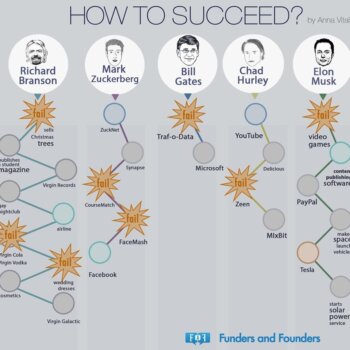The big moves, are made to polarize. You can’t win everyone, at the sametime, it is important to let go of those who aren’t pretty much bhakts of what it is that you are building to get to the finish line. But you can also lose your right hand man if you decide to go the other extreme.
When I saw pictures of the Flipkart office, I knew Amazon had won the war.
In the west, entrepreneurship is a bug that bites you when you are in school (college). Hence the reason why there is an ecosystem around Cambridge, MIT, Stanford, Berkeley etc. In India, it is the org where you get your first job. It defines, well, it will define who you are and how you think. Unfortunately, if you worked in one of the top four body shops, getting one to have an eye for detail is next to impossible – there are rare ones though.
Workspace sets culture. I would close my eyes and back an entrepreneur who comes from Amazon, Microsoft, Yahoo or Bosch. These are entrepreneurial orgs, and there is a culture of frugality and innovation built into their genes. People work hard, without expecting to be pampered. They don’t expect an art gallery to work out of. Art galleries aren’t productive spaces. And startups and offices are quarries, not galleries.
I still remember the story of Amazon, where they refused to spend money on fancy tables. So they took doors, put it on four legs and used them as tables. Startup legend says, there are still offices where they have those tables.
“These desks serve as a symbol of frugality and a way of thinking. It’s very important at Amazon.com to make sure that we’re spending money on things that matter to customers,” said Bezos, 34. “There is a culture of self-reliance. (With the low-tech desks) . . . we can save a lot of money.”
Take the other extreme, where we have struggled turning entrepreneurs out of google engineers. They are given in to a culture of excess, and that is death in the startup world. Bring them into a startup and they expect free flowing food, colorful bean bags, unlimited computing resources and the attitude of “It doesn’t make business sense, but why not?” Sure, corporates that are lost in the dark with 1% of your products generating cash, taking blind shots can adapt that strategy, but such attitude in a startup is death. You can only afford to swing once or twice and miss, in the startup world.
So, they have set the tone for polarization. Here’s an org that survived through the dot com bust, is known for frugality and is publicly traded (and even though hasn’t made profit, is well regarded). And then there is this new kid in the block, who owned a subcontinent, and is now starting to give into excess.
Funny thing is, orgs like Google and Facebook and even Microsoft can afford to give into excess. They have margins to be able to do that. All said and done, at the end of the day, Flipkart is a trading site, where they make margins out of goods sold. Close your eyes, imagine the biggest distributor in the world and imagine their offices. I’d guess it doesn’t look like an art gallery. Someone had made the decision, that they are going to go the way of the excess (not with money earned but with borrowed money), that unfortunately isn’t going to last long. Worse, you are also ruining a whole new wave of entrepreneurs who probably took the first job there, with a culture of excess.
If there is a war coming, and one that you need to win, you need by your side an army that gets the vision of what you are trying to accomplish (and makes the sacrifice to stand by your side). If you have to get people moving with facade and glamour, there is a chance that you don’t have a purpose to paint, just fashion. Fashion fades. Purpose wins the war for you.





























